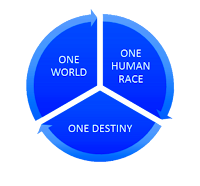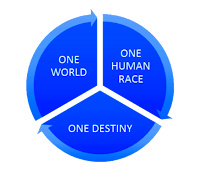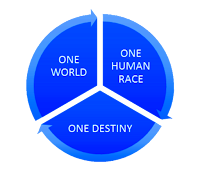RACISM HURTS AND CAN DESTROY HUMAN LIVES, BUT, YES...
If we reap what we sow, then it is vital that we sow positivity and harmony, which is what we should aspire towards, and not negativity and fear, which is what we definitely do not want.
Yes, it really is the case that racism, when it is expressed, can cause acute hurt to the victim, and can, in its more virulent form, destroys human lives. And, despite this, the victims and society has a duty, a responsibility to deal with it, as best and as effectively as they can.
It is not about whether each of us have a duty and responsibility to challenge racism, but rather a matter of how best to address it. Now, it is the case that, depending on where a person or persons are when they are subjected to racist acts, your options for challenging it might be many or few. For example, if you are a lone person of Polish, or Jewish, or Asian, African-British, or German origins, when you find yourself being targeted by one or more persons of another ethnic group, you might form the conclusion that, the best way of challenging it might be to hold your tongue.
At least, if it is verbal abuse you are being subjected to, and if there are other people of the perpetrator's ethnic group present, but seemingly disinclined to offer you support. In another situation, you might make the evaluation that you are not so outnumbered as to be at a big disadvantage, if you challenge the racism of the perpetrator.
Non-racism, like a strong and healthy tree, needs a conducive environment and careful nurturing.
There might also be occasions when it might be relatively safe for you to stand your ground and verbally and/or physically take on the person who is being racist towards you.
How well any person/s are able to 'deal with racism', which, as Nadiya Hussain, the now well-know British Bake Off winner, has argued, and went on to observe, rightly, that she is not the only person suffering it, but that others do as well. Nadiya, of course, is making a very valid point. She is not advocating that racism should not be challenged, as not to address it might simple result in it taking greater hold within the societies in which we live.
Rather, I believe, Nadiya is arguing that none of us, of whatever ethnic, national or religious backgrounds should allow ourselves to have our living, our freedom of thought, non-pernicious speech and right of movement, circumscribed by people who take delight in causing others pain.
Racism is something which can be expressed in a number of different ways, but probably primarily in what we can call personal racism, and institutional racism, with the former being that which targets individuals per se, and the latter, which targets particular group or communities.
For example, we can have the individuals or group of individuals who hate people belonging to certain nationality, ethnic groups, and or religious communities. Examples can be like Catholics and Protestants in Northern Ireland hating each other on religious and historical basis. Or poor Northerners in England hating people of Polish and other eastern European origins, on the stereotypical refrain that they are 'taking our jobs away,' or it might be Sunnis and Shias hating each other because of their perception or misperception about which of their differing version of Islam is the right one.
It might also be about White Germans, British, French or American people disliking people of other ethnic groups, because of their negative perceptions and fears about them. And, yes, it might be people of Asian origins disliking people of African and Caribbean origins and vice versa. In other words, we are all at greater or lesser risks of acting like or becoming racists. What prevents most of us from stumbling int the void or over the precipice, is our ability to empathise with others; to have our actions informed by reason and logic, instead of predominantly our feelings.
This kind of 'personal impact' expression of racism can be very painful to the victim. However, unless it is persistent, systematic, or result in a serious physical assault, the chances are that most of us who are subjected to it should be able to fight it and get on with our 'normal living', without it causing us long-term or serious emotional and psychological damage.
It has been said that, 'a problem shared is a problem halved.' Of course, if that problem, let us say, racism, is being shared by many people, then it will be more than halved, and should become more solvable. If a society is institutionally geared up to challenge racism, it will make it easier for racism to be confronted and challenged. If society and governments put in place the necessary physical, legal, moral, social policies and institutional framework,it will help to create a climate which is conducive towards effectively challenging racism.
If we know that expressing racist comments, thoughts and ideas about and towards others is going to be met by disapproval by members of our families, our friends and strangers, we will think carefully before voicing them, if ever. If a person from a minority ethnic community believes that strangers are likely to stand up for them if others subject them to racism, then that person will have the confidence to also challenge such behaviour.
We need to avoid investing too much in apparent doom and gloom, and hold on the the certainty that the light and warmth of the Sun is behind the transient dark clouds.
If these are racist in their nature and how they are systematically implemented, then the goodwill of the ordinary and even activist citizenry is unlikely to have much lasting impact in diminishing the occurrence of racism in any society.
It is vital that governments give a lead in kind of societies they want to promote, and that they avoid pandering to actual and perceived ethnocentricity of the poorer and more economically more fearful sections of their society.
When all of us take a personal and collective responsibility for nurturing a better world, the challenge of doing so, becomes less formidable and the aspiration more achievable.












Comments